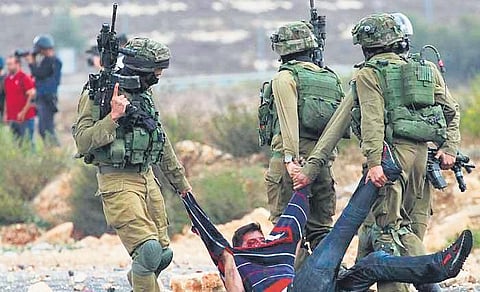

Canadian Prime Minister Justin Trudeau has alleged that operatives from the Indian government were involved in the assassination of Khalistani terrorist Hardeep Singh Nijjar on Canadian territory. Nijjar was one of the most wanted terrorists in India before two unknown assailants killed him outside a gurdwara in British Columbia’s Surrey. A key functionary in the Khalistani network, Nijjar was declared an “individual terrorist” under the Unlawful Activities Prevention Act in July 2020. He was accused of involvement in multiple cases of targeted killings in Punjab and funding secessionist activities.
He was associated with Babbar Khalsa International before joining Khalistan Tiger Force (KTF) and becoming its head. Officials in intelligence agencies said Nijjar travelled to Pakistan to meet KTF leader Jagtar Singh Tara and handlers in the Pakistani spy agency Inter-Services Intelligence sometime in 2013-14. The Indian government had been pursuing the case since 2016, when Interpol issued a red notice against Nijjar in 2016 while the National Investigation Agency announced a Rs 10 lakh bounty ($12,000) on his head in July last year. So, there is unequivocal evidence of the individual’s involvement in terrorism and Canadian government’s hesitance regarding Indian demands of extradition of Nijjar (and other key Khalistani terrorists) since last few years.
Since 2015, when Trudeau came to power, pernicious developments have burgeoned rapidly in Canada, where anti-India elements often threaten Indian territorial integrity, issue open threats of life to Indian diplomats, diaspora (who are also Canadian citizens), announce rewards for assassination of Indian Prime Minister and government functionaries and violate the sanctity of religious institutions (Hindu temples in Canada). This trend picked up pace even further, when Trudeau invited NDP leader Jagmeet Singh to join the ruling coalition. Jagmeet has often vocally supported the Khalistani extremists and seen with anti-India elements. Trudeau’s domestic political compulsions are surrounded by the support of such organised criminals, drug-syndicates, human traffickers and terrorist enablers. How Trudeau has been performing for the Canadians is a matter of their internal debate, but as far as India is concerned, the Trudeau regime has been a nightmare.
The Canadian PM’s recent lacklustre show at G20 summit in New Delhi has been a political embarrassment for him at home. As per media reports, he was chastised by Indian Prime Minister Modi for being soft on Sikh terrorists. So, it was being anticipated that he will play a face-saving manoeuvre to divert domestic attention towards an external power to preserve his falling approval ratings at home. This is why, the moment he left (after an overstay caused by his aircraft malfunction) New Delhi, the same apprehension was expressed by Shuv Majumdar (the MP for Calgary Heritage, Canada) that Trudeau will soon vilify the world’s largest democracy. On expected lines, he disinterred an old case for which no direct evidence of Indian government (or citizen) has been found until now. Despite Trudeau and his foreign minister acknowledging ongoing investigations, he opted to prejudge Indian involvement, casting a shadow over the judicial process. By making this reckless statement, he undermined the core tenet of a just trial, using his position of authority to potentially sway the legal process, a phenomenon often observed in legally precarious societies.
ALSO READ | Khalistan: The Canadian connection
For a fleeting moment of triumph for the Trudeau administration, let us entertain these allegations at face value, assuming that it was indeed the Indian government (acting through its agents) who had incapacitated these terrorists on Canadian soil. This will undoubtedly be a source of immense pride for Indian citizens, as it will reinforce their trust in the government’s dedication to safeguarding their well-being and defending the nation’s territorial integrity against any form of encroachment or infringement. This unwavering determination would evoke parallels to the operational methods of the Israeli Mossad, known for their resolute approach.
The Israeli Mossad has received international acclaim (as well as criticism from adversaries) for going to extraordinary lengths, even surpassing expectations, to safeguard the nation’s fundamental security interests. From Operation Wrath of God (of early 1980s), to the assassination of Atef Bseiso, Yehiya Ayyash and Mahmoud Al-Mabhouh (to name a few), Israeli Mossad has remained uncompromisingly ahead in neutralising the threat right where it evolves (or proliferates). While executing these operations, the Israeli government has shown unwavering resolve, regardless of the views held in Western media and think tanks. The former Israeli Prime Minister Golda Meir had fearlessly said, “If we have to have a choice between being dead and pitied, and being alive with a bad image, we’d rather be alive and have the bad image.”
India, under Modi government, has remained unflinching regarding the core security interests of the nation. If the Trudeau administration had been more transparent regarding Khalistani terrorism, and had not provided refuge for terrorists who pose a threat to Indian citizens and territory, and if they had appropriately addressed India’s extradition requests for these convicted criminals, in line with the norms of international relations observed by civilised nations, India would not have found it necessary to take action on behalf of the Canadian government.
The Trudeau administration’s failure to take necessary minimum action bears significant responsibility for lifting the veil of Canadian sovereignty. While coming to power in 2014, Modi had articulated his foreign policy vision by saying that “India will neither show arrogance nor bow down, but will meet eye to eye.” This principle has echoed consistently in India’s contemporary diplomatic endeavours. Clearly, peace is India’s pledge, but should conflict knock, we will be the force to seal it shut.
ALSO SEE:
Shukla is an analyst who expresses opinions on matters of global significance. He can be contacted at X: @postsfromVivek.